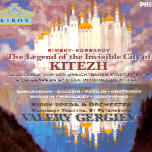Considered by many to be Rimsky-Korsakov’s greatest opera, recordings and performances of The Legend of the Invisible City of Kitezh and the Maiden Fevroniya (as the full title goes) have been virtually non-existent, even from Russia. Tradition assigns the blame for this to the libretto (big surprise), which is a conflation of two separate mythological stories, but this is nonsense. Frankly, if I read one more liner note that talks about the composer’s dissatisfaction with his librettist, the screaming you hear isn’t going to be that of the singers. What matters is that Rimsky-Korsakov set the words as they stand, so it was good enough for him. More to the point, the opera contains, in the portrait of the drunken loser and “bad guy” Grishka Kuter’ma, the most fascinating character sketch in all of his operas, not to mention literally acres of music that is simply drop-dead gorgeous by any standard.
Rimsky-Korsakov’s conception of opera was a personal one, owing little to the late-Romantic concern for character development and psychological insight. In fact, it most closely resembles Rossini, whose characters are almost mechanical in that they function as cogs in the great plot machine, seldom changing or developing but rather representing a consistent point of view or theme. While unfashionable as a dramaturgical theory today, there’s absolutely nothing wrong with this conception as a valid starting point for an evening at the theater. Rimsky’s operas are full of attractive arias, ensembles, and choruses. Even at their most static, they are so marvelously orchestrated and saturated with attractive music that their neglect in the West (to say nothing of Russia) is simply incomprehensible.
The plot of this particular opera, Rimsky’s second-to-last, is complex in detail but simple in essence. The maiden Fevroniya is the very soul of goodness. She meets and falls in love with Prince Vsevolod, and the two agree to marry (Act One). The Prince is the defender of Kitezh, and the great noble families, distressed that their prince will marry a commoner, hire Girshka to destroy her reputation (Act Two). In the meantime, Fevroniya gets kidnapped by Tartars planning to invade Kitezh; the prince is killed in battle, and Grishka claims that Fevroniya is leading the invaders to the capital city, which God has thoughtfully rendered invisible at the request of the terrified populace (Act Three). As the invaders approach, the city of Kitezh reappears long enough to scare them away, and Fevroniya rejoins her prince inside the gates: he and all of the vanquished have been granted eternal life within. Grishka, naturally, is denied entry, but Fevroniya sends him a letter of forgiveness as the city once again disappears (Act Four). It may sound implausible, but it’s a myth, after all, and as always in cases such as this, great music (and make no mistake, this is very great music) brings the whole thing magnificently to life.
Valery Gergiev’s ongoing Rimsky-Korsakov series is simply the most important thing happening in the world of opera today, promising revelations on a par with Philips’ previous explorations of Haydn and early Verdi, or Decca’s fabled Janácek cycle. He has assembled an outstanding cast, headed by Galina Gorchakova’s sweet and sensible Fevroniya as well as Vladimir Galuzin’s superbly tormented Grishka. Taken from live performances, but with minimal audience and stage noise, the performance starts well, but then really catches fire in the last two acts, which also contain the most luminous music. The recording has the feel of a major “event,” which is exactly as it should be. We can only hope that Universal isn’t in such poor shape that it can’t continue with this tremendous series. After all, we still need great recordings of works such as The Snow Maiden, Christmas Eve, May Night, Tsar Sultan, and Rimsky’s very last opera, The Golden Cockerel. It’s a legacy very much worth getting to know. [1/1/2000]
































